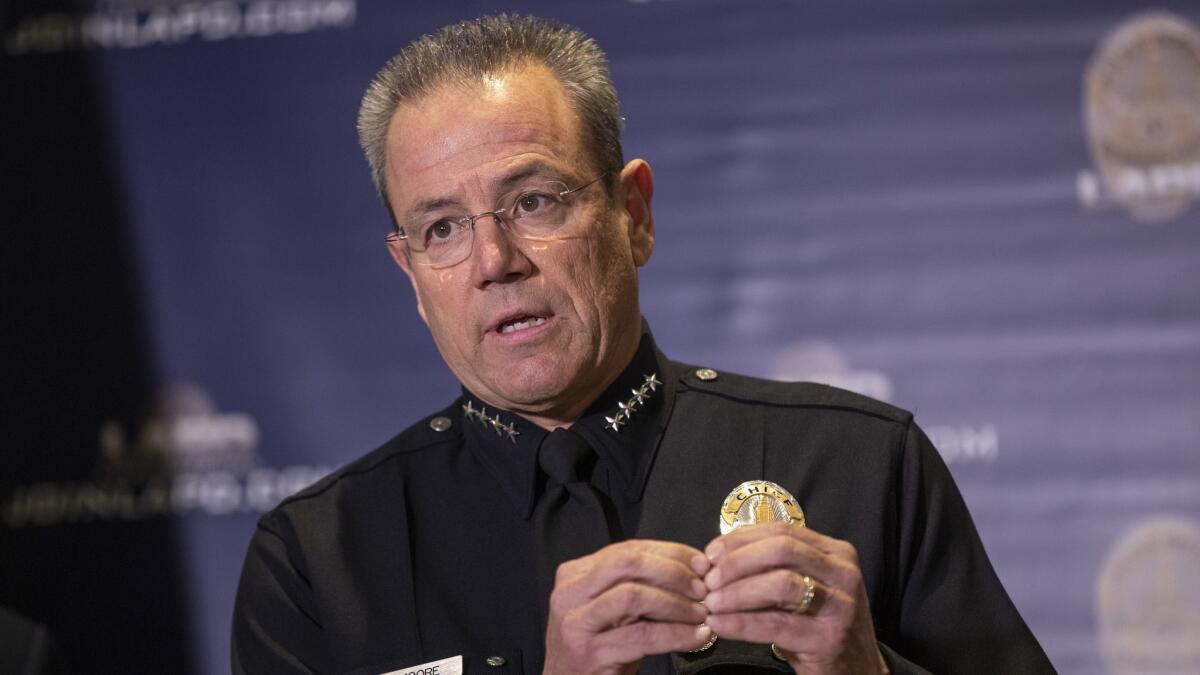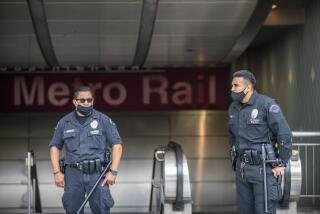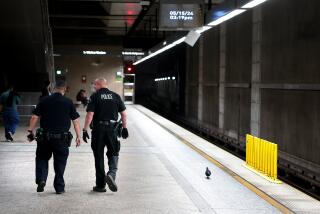LAPD begins cost cutting, and units must ‘show your relevance,’ chief says

During a recent meeting with officers from the elite but troubled Metropolitan Division, Los Angeles police Chief Michel Moore offered support for their crime-fighting mission, but also a warning he’d previously shared with command staff.
With significant reductions in the force looming, every unit is under a microscope — and must prove its worth.
“Show your relevance,” Moore recalled saying.
Following a historic $150-million budget cut, and amid a nationwide re-imagining of what policing should be, the LAPD is reviewing its operational structure from top to bottom and pushing forward with potentially far-reaching internal changes in anticipation of an even broader shake-up, officials said.
The revamped LAPD will have hundreds of fewer officers to deploy by this time next year, and Moore has asked unit commanders throughout the department to write him proposals for what their teams should look like in such a future. The Metro force, which includes the department’s targeted enforcement teams, is being scrutinized closely for potential cuts, and gang units and other specialized squads are also likely to be slimmed down.
Some fear a reduction in patrols as well, meaning fewer officers on the streets and in neighborhoods, though officials have said they intend to limit such cuts. Programs that center cops in the community, meanwhile, will be expanded.
“We need to look at how we police the city with the scant resources that we have, and determine how we can find alternatives if our current practices aren’t going to continue to work,” Moore said in an interview with The Times.
Assistant Chief Horace Frank said the department will probably concentrate resources on patrols and community outreach, while trimming specialized units and other police functions that are somewhat removed from directly serving neighborhoods.
It’s likely that some officers who have been assigned to specialized units will go back on patrol, officials said.
“Patrol is absolutely our base service. That is our primary core, and then everything spins around that,” Moore said.
The entire conversation represents a radical departure from policing discussions in L.A. just a few months ago, when officials were talking about increasing the police budget. It also falls against a backdrop of the coronavirus pandemic, which has dealt significant blows to city coffers; a recent increase in homicides in L.A.; and massive protests for police reform that broke out in major cities across the country following the police killing of George Floyd in Minneapolis in May.
For too long, demonstrators allege, police departments have been bloated, their budgets allowed to balloon to ridiculous levels because they are viewed as sacrosanct by city politicians fearful of crime and all the implications that come with it. Instead, demonstrators have demanded that police be “defunded,” with those dollars redirected to hire more social workers, mental health professionals and transportation employees to respond to a plethora of calls that don’t require an officer with a gun.
Some activists called for the Police Department to be abolished entirely. Others called for its budget to be cut by 90%. One called the $150-million cut “pocket change.”
“We are saying defund the police,” Black Lives Matter-LA co-founder Melina Abdullah said at a City Council hearing last month. “We’re also saying re-imagine public safety.”
“We know that public safety is not policing,” actor and activist Kendrick Sampson said at the same hearing.
With defunding suddenly gaining traction, the council acted last month by slashing the LAPD’s funds. It also put forward a few additional ideas for reshaping the LAPD. But planning for how the cut would play out on the ground and within the department was lacking, and department officials were sent scrambling.
Moore, who approves of shifting some police responsibilities to civilian agencies, sees any such plan unfolding over time, with careful preparation. His more immediate challenge, he said, is shepherding the LAPD forward with less funding and without sacrificing public safety while a clearer framework for the future is developed.
The questions before him, he said, are twofold: “How am I going to realign the organization? And, in the interim, how am I going to handle the workload while we decide what we’re going to stop doing?”
Given the city spends about $3 billion on the LAPD annually, critics have viewed the recent cut as relatively minor and indicative of little change. But police officials don’t see it that way.
By this time next year, they expect to have 250 fewer sworn officers, bringing their total to about 9,750 — the lowest in a dozen years. They’ll also lose about 140 civilian employees, Moore said. The transition to a smaller force has already begun, with hiring curtailed despite sustained attrition.
Eric Miller, a professor at Loyola Law School who focuses on policing issues, said Moore is in a tough spot, facing pressure from all sides — elected officials, the civilian Police Commission, rank-and-file officers, protesters, and most of the rest of the public, who want to see change but still value police in their neighborhoods and quick response times when they call for help.
But police officials have survived similar moments in the past by targeting units that face scrutiny — such as Metro — or are unproductive, Miller said.
“What he has to do is suggest that he is making significant reforms in areas that people are shouting loudest about, but which don’t necessarily impact the core mission of police as he sees it,” Miller said. “What you want to do is work out which units are causing you disciplinary headaches, use that as an excuse to trim the unit, and use that as a sop to the mayor and the public.”
The proposals Moore requested from commanders are due in the coming days and weeks, he said, and will help inform decisions about what units should stay, which ones can go — if any — and which should be reconfigured.
“What is the size of them going forward? That question is being asked of every command,” he said.
Moore acknowledged “there’s a lot of rumors” that Metro will be completely disbanded, but that is unlikely, he said.
The Metro Division is an amalgamation of several specialized units, including targeted enforcement teams, the SWAT team and the department’s mounted and canine units. For years, its members were praised by public officials for being at the forefront of a lot of police work, conducting thousands of traffic stops and seizing guns. Mayor Eric Garcetti at one point ordered the division’s expansion as a solution to violent crime.
However, since it was revealed last year by the Times that Metro officers were disproportionately stopping and searching Black drivers, many members of the 200-person team have been diverted to spend more time investigating crimes that have already occurred. That is important work that will continue, Moore said.
Beyond patrol and criminal investigations, the department is working to expand its Community Safety Partnership program, including devoting more command staff to the mission, as part of a directive from the Police Commission.
LAPD officials also are having conversations with officials from other agencies that may be asked to pick up some duties.
Moore recently told the Police Commission that he had begun discussions with transportation officials about a City Council proposal that would see some traffic calls handled not by police but by transportation employees. He said he can’t imagine transportation employees handling enforcement stops, but could see them responding to some collision calls.
“Our effort is to sit down together and understand what potential realignment of responsibilities might entail,” he said.
Moore said he is looking for ways to incorporate some ideas from officers.
“The wisdom of this organization doesn’t come from the 10th floor; it comes from the rank and file,” he said, referring to command offices at police headquarters.
Officers and the union that represents them have been critical of Moore and city officials in recent weeks, not only for their handling of the protests and surrounding unrest — where dozens of officers were injured — but for what they perceive to be an acquiescence to the department’s critics and a failure by officials to defend officers’ actions.
They say they worry about public safety at a time when homicides are up nearly 14% from last year and shootings are on the rise. And they say that little about the path forward is clear to them.
“It’s changing so fast. It just seems like every day, something else is going on,” said Craig Lally, president of the Los Angeles Police Protective League.
Lally said a lot of people are talking about defunding the police without a clear idea of what that even means — “they’re putting the cart before the horse.”
Given the force reduction, Lally said he expects there to be “massive shortages over the next few years in patrol,” and new demands for more cops from residents angry about rising crime.
More to Read
Sign up for Essential California
The most important California stories and recommendations in your inbox every morning.
You may occasionally receive promotional content from the Los Angeles Times.













